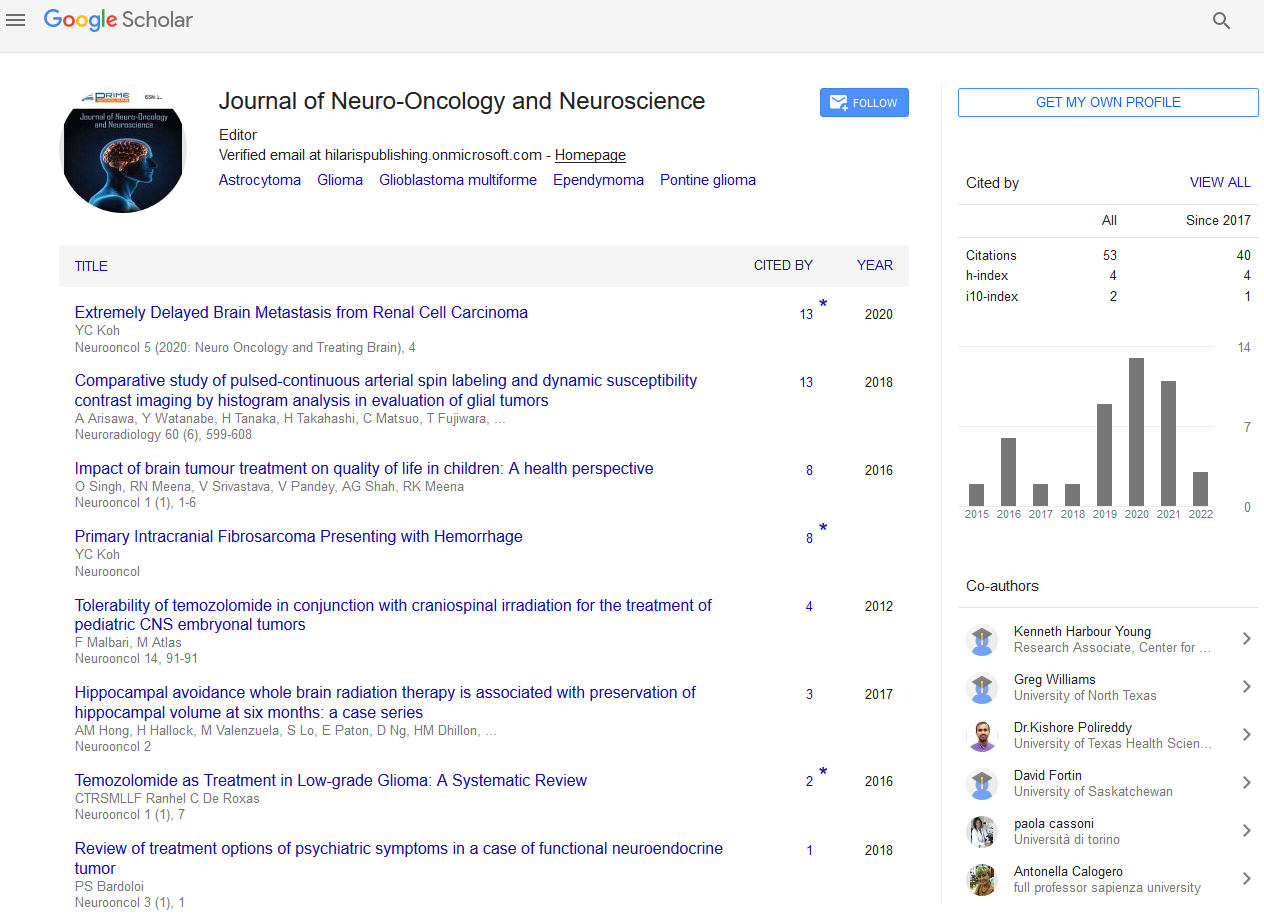Commentary Article - (2023) Volume 8, Issue 3
Harnessing the Power of Immunotherapy: Revolutionary Approaches for Neuro-Oncology
Saiful Islam*
Department of Neurosciences, State University of Bangladesh, Bangladesh
*Correspondence:
Saiful Islam,
Department of Neurosciences, State University of Bangladesh,
Bangladesh,
Email:
Received: 30-Aug-2023, Manuscript No. IPJNO-24-19608;
Editor assigned: 01-Sep-2023, Pre QC No. IPJNO-24-19608 (PQ);
Reviewed: 15-Sep-2023, QC No. IPJNO-24-19608;
Revised: 20-Sep-2023, Manuscript No. IPJNO-24-19608 (R);
Published:
27-Sep-2023, DOI: 10.21767/2572-0376.8.3.23
Description
In the realm of neuro-oncology, the emergence of immunotherapy
has sparked a paradigm shift in the way we approach
the treatment of brain tumors. Unlike traditional therapies
that directly target tumor cells, immunotherapy leverages the
body’s own immune system to recognize and eliminate cancer
cells, offering the potential for more durable and precise
therapeutic responses. In recent years, significant progress
has been made in developing immunotherapeutic strategies
tailored specifically for brain tumors, ushering in a new era of
hope for patients facing these devastating diseases. Central to
the success of immunotherapy in neuro-oncology is the concept
of immune checkpoint blockade. Immune checkpoints
are molecules on immune cells that act as “brakes” to regulate
the immune response and prevent excessive tissue damage.
Tumor cells often exploit these checkpoints to evade immune
surveillance, allowing them to proliferate unchecked. By blocking
these inhibitory pathways, immune checkpoint inhibitors
unleash the full power of the immune system to target and destroy
cancer cells.
One of the most promising immune checkpoint inhibitors in
neuro-oncology is pembrolizumab, which targets the programmed
cell death protein 1 (PD-1) receptor. Clinical trials
have demonstrated encouraging results in patients with recurrent
glioblastoma, leading to accelerated approval by the FDA
for its use in this setting. Similarly, nivolumab, another PD-1
inhibitor, has shown efficacy in treating refractory glioblastoma,
offering new hope for patients who have exhausted standard
treatment options. In addition to PD-1 inhibitors, cytotoxic
T-lymphocyte-associated protein 4 (CTLA-4) inhibitors have
also shown promise in preclinical and early-phase clinical trials
for glioblastoma. CTLA-4 inhibitors, such as ipilimumab, work
by enhancing the activation of T cells and promoting antitumor
immune responses. Combinatorial approaches targeting
multiple immune checkpoints simultaneously, known as checkpoint
blockade cocktails, are also being explored as a means to
augment therapeutic efficacy and overcome resistance mechanisms.
Furthermore, cancer vaccines offer a promising avenue for
stimulating antitumor immune responses in patients with brain
tumors. Vaccines designed to target tumor-specific antigens,
such as EGFRvIII in glioblastoma, have shown efficacy in preclinical
models and early-phase clinical trials. These vaccines
work by priming the immune system to recognize and mount
an immune response against cancer cells expressing the target
antigen, potentially leading to tumor regression and prolonged
survival. Ongoing research aims to optimize vaccine formulations
and identify novel antigen targets to enhance their therapeutic
efficacy in neuro-oncology. Despite these promising
advancements, challenges remain in the development and implementation
of immunotherapy for brain tumors. The bloodbrain
barrier, which restricts the passage of large molecules
and immune cells into the central nervous system, poses a significant
barrier to effective immune targeting of brain tumors.
Strategies to overcome this barrier, such as local delivery methods
and nanoparticle-based drug delivery systems, are actively
being explored to improve the efficacy of immunotherapy in
neuro-oncology.
Immunotherapy represents a groundbreaking approach to
treating brain tumors, offering the potential for more durable
and precise therapeutic responses compared to traditional
therapies. From immune checkpoint inhibitors to adoptive cell
therapy and cancer vaccines, a diverse array of immunotherapeutic
strategies are being developed and refined to combat these devastating diseases. While challenges remain, the rapid
pace of innovation in this field holds promise for transforming
the landscape of neuro-oncology and improving outcomes for
patients facing brain tumors.
Acknowledgement
None.
Conflict Of Interest
The author’s declared that they have no conflict of interest.
Citation: Islam S (2023) Harnessing the Power of Immunotherapy: Revolutionary Approaches for Neuro-Oncology. Neurooncol. 8:023.
Copyright: © 2023 Islam S. This is an open-access article distributed under the terms of the Creative Commons Attribution License, which permits unrestricted use, distribution, and reproduction in any medium, provided the original author and source are credited.

